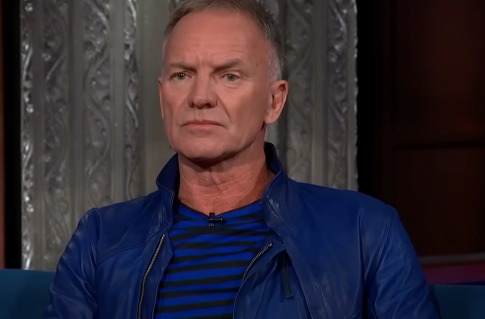Gordon Matthew Thomas Sumner, popularly known as Sting, has written a financial symphony that now reverberates across industries after delivering milk in Wallsend’s early mornings. His estimated net worth as of 2025 is an incredible $550 million, which reflects both his business savvy and musical talent. Because of long-term planning, a remarkably calculated catalog sale, and residual royalties that keep growing even as many of his contemporaries fade into nostalgia circuits, that number isn’t just the echo of record sales.
In 2022, Sting became one of the select few legacy artists who turned art into lasting wealth when he sold his whole songwriting catalog to Universal Music Publishing Group for an estimated $300 million. In addition to diversifying his source of income, this momentous move heralded a new financial language in the music industry, one that accords intellectual property the same respect as venture capital portfolios. Amazingly, one song, “Every Breath You Take,” brings in about $2,000 in royalties every day. This amount effectively conveys the power of ownership.
Sting – Personal and Career Details (For WordPress Use)
| Category | Information |
|---|---|
| Full Name | Gordon Matthew Thomas Sumner |
| Stage Name | Sting |
| Date of Birth | October 2, 1951 |
| Age (2025) | 73 |
| Nationality | British |
| Occupation | Musician, Actor, Songwriter, Philanthropist, Real Estate Investor |
| Net Worth | $550 million |
| Major Earnings | Music Catalog Royalties, Touring, Real Estate, Endorsements, Publishing |
| Notable Tracks | “Every Breath You Take,” “Fields of Gold,” “Shape of My Heart,” “Desert Rose” |
| Awards | 17 Grammys, Golden Globe, Emmy, Ivor Novello, Kennedy Center Honor, Rock & Roll Hall of Fame |
| Marital Status | Married to Trudie Styler (since 1992) |
| Children | 6 (including Joe Sumner and Eliot Sumner) |
| Former Band | The Police |
| Website | sting.com |
| Source | Celebrity Net Worth |
His decades-long wealth reflects the financial trajectories of other legendary musicians who have made money off of their catalogs, including Stevie Nicks, Bob Dylan, and Bruce Springsteen. However, Sting’s case is especially novel. His timing couldn’t have been better: he sold right before the market was overloaded with legacy content and as streaming algorithms increased demand for well-known, successful songs. His early jazz training, which required improvisation and rhythm to harmonize, has surprisingly translated well to business strategy in this changing digital landscape.

Sting was already well-known as a sonic pioneer in the 1990s. However, his post-Police solo pivot was what honed his business acumen. Not only did albums like Brand New Day and Ten Summoner’s Tales receive praise from critics, but they also became sonic assets that were certified Platinum or multi-Platinum in several nations. His cross-generational collaborations with artists like Bryan Adams, Mary J. Blige, and Sheryl Crow demonstrate his extraordinary versatility in spanning decades without coming off as dated.
It’s interesting to note that his refusal to lavish his six children with generational wealth demonstrates a mindset that prioritizes independence over indulgence. Sting stressed work ethic and personal responsibility while publicly declaring that his fortune won’t be fully passed on. Although there were conflicting responses to this stance, it represents a growing belief among wealthy individuals, such as Simon Cowell and Warren Buffett, that inherited privilege can occasionally weaken purpose.
Special acknowledgement should be given to “Every Breath You Take”‘s financial impact. Following its 1983 success, the song underwent a cultural renaissance when Puff Daddy (now Diddy) reworked it as a tribute to The Notorious B.I.G. called “I’ll Be Missing You.” This version was particularly influential because of the legal arrangement behind it, not just because it won a Grammy or sold millions of copies. Sting received full publishing royalties because Diddy failed to obtain permission beforehand; it is said that they made more money from that song than nearly any other in contemporary history.
Sting has diversified with notable discipline outside of music. He and his spouse, Trudie Styler, have kept up a real estate portfolio that includes a posh penthouse in New York that sold for $50 million and an estate in Malibu that was once rented for $200,000 during prime times. These properties are calculated investments that represent a larger trend of entertainers using tangible assets as financial levers rather than just being symbols of excess.
Sting’s work is equally compelling from a philanthropic standpoint. He used his celebrity to promote environmental causes by co-founding the Rainforest Foundation Fund with Trudie and native leader Raoni Metuktire. Global recognition for his efforts has led to the naming of a species of Colombian tree frog in his honor, Dendropsophus stingi. Sting has successfully combined celebrity and responsible leadership in a way that feels surprisingly genuine through her continued activism with Amnesty International, Band Aid, and Live Earth.
His voice, both literally and figuratively, has consistently resonated from stadiums to UN summits, from award stages to Broadway theaters. Sting’s journey highlights the remarkable resilience of artistry coupled with ownership in a music economy that is now controlled by clicks, metadata, and streaming algorithms. His recent compilation albums and Vegas residency serve as clear reminders of his timeless relevance rather than being sentimental cash-ins.
It’s a very clear lesson for younger artists. Timing, creative control, and intellectual property rights can produce longer-lasting benefits than just notoriety. Many people strive for fleeting viral fame, but Sting has built a prosperous life that continues to expand while he sleeps. He is positioned not only as a music icon but also as a case study in financial foresight, with a $300 million deal in his past and $2,000 a day reportedly coming in from one song.


